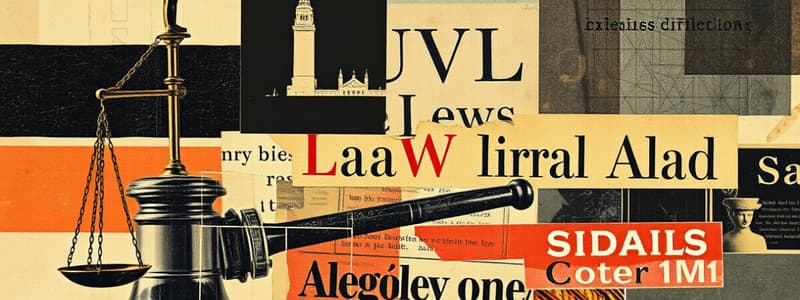Podcast
Questions and Answers
What is litigation?
What is litigation?
- An informal settlement process.
- The process of filing claims in court. (correct)
- A legal authority to hear a case.
- The highest court in the country.
What does alternative dispute resolution refer to?
What does alternative dispute resolution refer to?
Any other formal or informal process used to settle disputes without resorting to a trial.
What do trial courts determine?
What do trial courts determine?
The facts of a particular dispute and apply the law given by earlier appellate court decisions.
What does jurisdiction refer to?
What does jurisdiction refer to?
What is subject matter jurisdiction?
What is subject matter jurisdiction?
What are trial courts of limited jurisdiction?
What are trial courts of limited jurisdiction?
What characterizes trial courts of general jurisdiction?
What characterizes trial courts of general jurisdiction?
What is the most important court in the trial courts of general jurisdiction?
What is the most important court in the trial courts of general jurisdiction?
What is personal jurisdiction?
What is personal jurisdiction?
What are the grounds for personal jurisdiction?
What are the grounds for personal jurisdiction?
How many judges typically hear cases in appellate courts?
How many judges typically hear cases in appellate courts?
What do appellate courts generally accept?
What do appellate courts generally accept?
Who is the appellant?
Who is the appellant?
What is the appellee?
What is the appellee?
What allows both sides in appellate courts to submit written arguments on a case?
What allows both sides in appellate courts to submit written arguments on a case?
What does 'affirmed' mean in legal terms?
What does 'affirmed' mean in legal terms?
What does 'eversed' refer to?
What does 'eversed' refer to?
What establishes the limitations on the types of cases federal courts can hear?
What establishes the limitations on the types of cases federal courts can hear?
What are the two kinds of civil lawsuits permitted in federal court?
What are the two kinds of civil lawsuits permitted in federal court?
What characterizes a federal question case?
What characterizes a federal question case?
When do federal courts have diversity jurisdiction?
When do federal courts have diversity jurisdiction?
What is the primary trial court in the federal system?
What is the primary trial court in the federal system?
How many districts is the nation divided into?
How many districts is the nation divided into?
Who nominates all federal court judges?
Who nominates all federal court judges?
Who confirms the president's judge nominees?
Who confirms the president's judge nominees?
How many circuits of intermediate courts of appeals are there?
How many circuits of intermediate courts of appeals are there?
Where do most suits about federal statutes begin?
Where do most suits about federal statutes begin?
What is the highest court in the country?
What is the highest court in the country?
How many justices are on the Supreme Court?
How many justices are on the Supreme Court?
What makes up the justices on the Supreme Court?
What makes up the justices on the Supreme Court?
What is a writ of certiorari?
What is a writ of certiorari?
What is an example of when a writ of certiorari may be filed?
What is an example of when a writ of certiorari may be filed?
How many justices must vote in favor of hearing a case before a writ will be granted?
How many justices must vote in favor of hearing a case before a writ will be granted?
What is a complaint?
What is a complaint?
What is the purpose of the complaint?
What is the purpose of the complaint?
Flashcards are hidden until you start studying
Study Notes
Key Legal Terms and Their Definitions
- Litigation: Process of filing claims in court, potentially resulting in a trial.
- Alternative Dispute Resolution (ADR): Formal or informal methods for settling disputes without a trial.
- Trial Courts: Courts that establish facts of a dispute and apply relevant law from earlier appellate decisions.
- Jurisdiction: A court's power to hear and decide a case.
- Subject Matter Jurisdiction: Authority of a court to hear a specific type of case.
- Trial Courts of Limited Jurisdiction: Courts restricted to hearing certain types of cases.
- Trial Courts of General Jurisdiction: Courts that can hear a broad range of cases, including virtually any civil lawsuit.
Personal Jurisdiction
- Personal Jurisdiction: Legal authority to mandate a defendant to stand trial or pay judgments.
- Conditions for Personal Jurisdiction:
- Defendant is a resident of the state where the lawsuit is filed.
- Defendant actively participates in the lawsuit.
- Long-arm statute applicability allows courts to reach out-of-state defendants.
Appellate Courts
- Judges in Appellate Courts: Cases are typically heard by three or more judges together.
- Appeals Courts: Review facts established by trial courts to check if legal errors occurred.
- Appellant and Appellee:
- Appellant: Party filing the appeal.
- Appellee: Party opposing the appeal, usually the winner at trial.
- Written Arguments: Both parties submit briefs outlining their legal arguments.
Court Outcomes
- Affirmed: When a court ruling is upheld and permitted to stand.
- Eversed: When a court ruling is nullified and overturned.
Federal Court System
- Establishment: Federal courts operate under authority granted by the U.S. Constitution.
- Types of Civil Lawsuits in Federal Courts:
- Federal question cases: Involving U.S. laws or treaties.
- Diversity cases: Involving parties from different states and exceeding $75,000 in dispute.
Federal Trial Courts
- Primary Trial Court: United States District Court.
- Number of Districts: The nation is divided into 94 federal judicial districts.
- Judge Nomination and Confirmation:
- Nominated by the President of the United States.
- Confirmed by the Senate.
Appellate Circuits and Supreme Court
- Circuits of Intermediate Courts of Appeals: There are 11 circuits.
- U.S. Supreme Court: The highest court in the United States with nine justices, including one chief justice.
- Writ of Certiorari: A petition for the Supreme Court to review a lower court's decision, requiring approval from four justices to move forward.
Legal Process and Initial Filings
- Complaint: Initial document outlining the facts and legal claims of the plaintiff.
- Purpose of the Complaint: To inform the defendant of the nature of the claims and the need to respond.
Studying That Suits You
Use AI to generate personalized quizzes and flashcards to suit your learning preferences.




